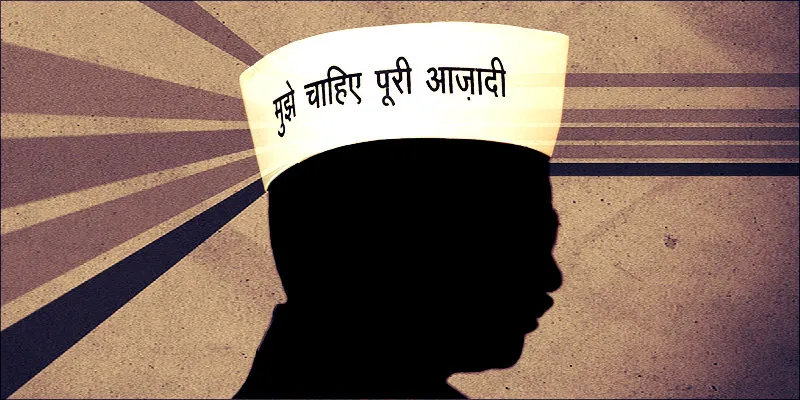In the age of entrepreneurship, how a political startup captured the common man’s imagination
In the middle of a conversation, a friend once asked if I agreed that Aam Aadmi Party (AAP) was a political startup. I did not agree with him initially, but what he said got me thinking. Increasingly, we are hearing of dynamic youngsters, inspired by stories of Silicon Valley dropouts, quitting their well-paying, secure jobs and starting their own companies. They are doing well too, despite not coming from families of entrepreneurs. So my friend’s words made an impression.

It is a well-known fact that politics is a dirty game and the political class is looked upon with emotions bordering on hatred and contempt by the working class. A well-meaning citizen does not want to soil his/her image by jumping into politics. It was, therefore, seen as something of a joke by many when a person who was shouting from the rooftops about corruption at the Parliament and calling for a systemic overhaul suddenly start a political party himself.
A motley group of people dared to start something which was thought, earlier, to be impossible. No denying the fact that these were the people who built a movement against corruption from seemingly nothing. Just a few individuals decided to do a dharna to force the Central government to find an institutional framework to eradicate corruption. This received unprecedented support across India, but the system’s response to such mass movements also died down. It was, therefore, time to change the strategy. This was when AAP was born; its main architect none other than Arvind Kejriwal.
Like any other business startup this group had nothing except an idea. The idea was to, as good citizens, take matters into their own hands and change a rotting system. They could either confine themselves to the limited space of civil society movement or to jump into the dirty game of politics to cleanse from within. Organising few movements, staging a dharna from time to time, conducting protest marches and stirring up the public anger, although worthwhile, came with little accountability and no threat to being submerged in dirt. Getting into politics was dangerous, and success rate was almost nil.
The group went for the difficult option: a John Scully-moment of sorts. John was doing fine as the CEO of Pepsi, when he was approached by Steve Jobs, who asked him, "Do you want to sell sugar water for the rest of your life, or do you want to come with me and change the world”. John left his cushy job, decided to be part of Apple as he longed to make a difference.
Time was ripe in India. Society was changing. New-age kids aspired for a different world, a just world without corruption. Arvind and his team launched to trek a difficult path gripped by what many said reeked of ‘hippie idealism’ or the counter revolution of the 60s generation in the US. Nobody gave them a chance but they surprised everyone with their success, once in 2013 and again 2015. The reason behind their success? They did not have money which, till then, was the defining line for political success. They did not have cadre, organisation or an office. They had nothing except an idea which was considered by many to be too utopian.
But like any successful startup, this idea was timely and had a target audience. It clicked and did great business in its first year itself proving everyone wrong and leaving its competitors gasping.
Like every great startup, AAP has a very strong leader in the form of Arvind Kejriwal, and a committed team of individuals which is ready to walk the extra mile. The best part of a startup is it does not have to deal with legacy nor is it constrained by the past. Every move is a new one and competition does not have the luxury of past to assess its strength and plan accordingly to counter it.
It suits every start up to play an underdog and as not a significant a player in the game. Instead, the startup has to play its assets in innovation and connecting the product with the demand in the market. AAP introduced many new concepts of political campaigning. With no money, the party had no option but to contact every potential voter in its vicinity. It made door-to-door campaigning a new buzz word, and, by the second Assembly elections, the main competitors to this startup, BJP Congress, were left with no option but to copy their tactic, as AAP raised the bar for voter connect.
The party took the road less travelled. In the age of TV and newspaper advertising, AAP made radio campaign fashionable. AAP did not take the beaten route of caste and religion to attract voters. It focused on the basic issues of the aam aadmi just like how Apple moved in the direction to make computer more accessible, more user-friendly and easy to carry with perfect design. The party’s success lies in reprogramming traditional politics and presenting a new product, aspirational and moral in its DNA. A society fed up with the traditional politics lapped it up and bolstered it into the most interesting political startup of the new century.
But to succeed on a long-term basis AAP, like Apple, has to engage in continuous innovation, without losing its original core idea, to remain original and successful. Steve Jobs said,
Innovation has nothing to do with how many R&D dollars you have. When Apple came up with the Mac, IBM was spending at least one hundred times more on R&D. It's not about the money, it's about the people you have, how you are led and how much you get it.







